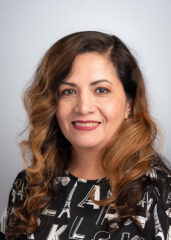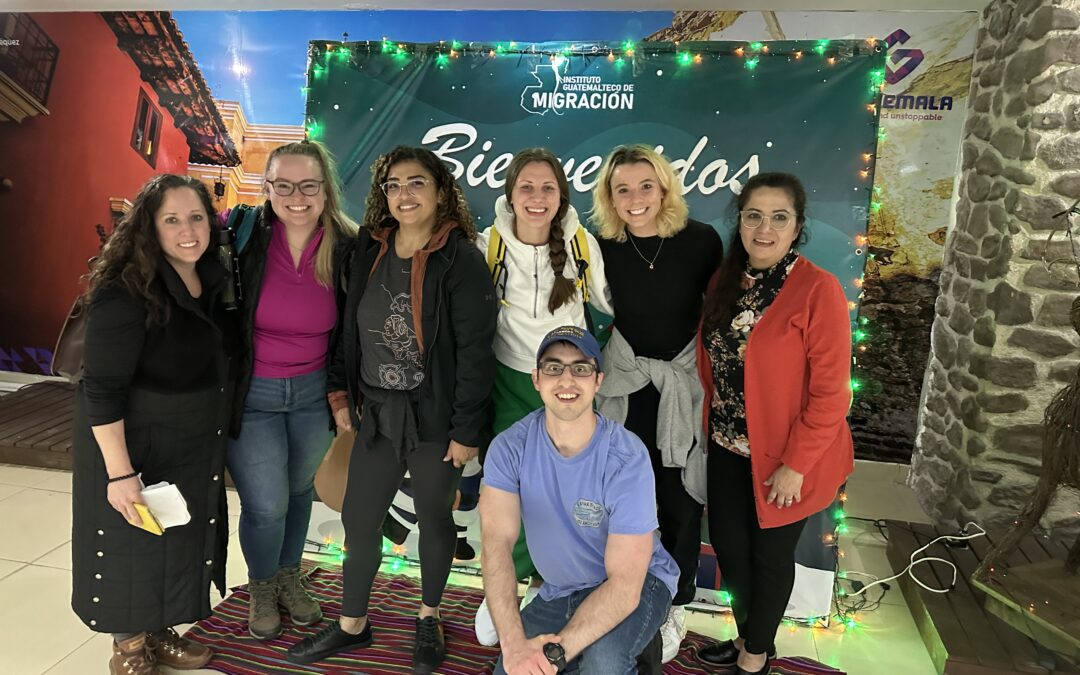University of Wisconsin Oshkosh accelerated nursing students Virginia Davidson, Emma Walters, Faith Diaz, Megan Prorok, Gabriella Storin and Charlie Menke, front, are photographed with instructor Maria Graf, far right.
Students from the University of Wisconsin Oshkosh accelerated nursing program recently completed an international clinical in Guatemala, the first of its kind in the nation.

Maria Graf
“We are the only 12-month accelerated nursing program in the country to offer an international component,” said Maria Graf, an assistant professor in the University’s College of Nursing. Graf led six students on an eight-day study abroad clinical to Chimaltenango and Sacatepéquez, Guatemala, in mid-December. There, the UWO students worked alongside nursing students from the Universidad Mariano Galvez to promote nutrition education to two vulnerable populations—women of reproductive age and children under 5.
Graf explained that the nursing students from both countries became a team.
“They had a common goal to promote health and well-being,” she said. “There was a language barrier, but the nursing language was common, and that’s how they communicated.” (Graf interpreted for the students and the group had an interpreter with them during the trip.)

UWO student Gabriella Storin assists community members with activities as part of her teaching workshop.
Nursing students Megan Prorok of Bruce, Wisconsin, and Gabriella Storin of Neenah, led interactive discussions with young children, focusing on the significance of diverse nutrient consumptions.
“Our initiative, ‘Eat the Rainbow,’ emphasized the benefits of a colorful diet rich in locally available fruits and vegetables,” Storin said. “Utilizing a ‘rainbow board’ we had the children place colorful produce items within the rainbow, encouraging active participation and knowledge retention.”
Prorok said they related each of the colors of the rainbow to a whole fruit or vegetable of the same color and how each color food has beneficial nutritious properties, especially related antioxidant content.
Storin and Prorok, who both secured nursing jobs prior to their graduation in February, said their study abroad clinical will make them better nurses. Storin accepted a position as a graduate nurse at ThedaCare – Neenah in the obstetrics unit. Prorok will work as a graduate nurse at ThedaCare Medical Center – Waupaca.
“This experience equipped me with invaluable skills and insights that will enhance my practice as a future nurse,” Storin said. “Immersing myself in a different health care system and culture fostered adaptability and cultural sensitivity, essential qualities in providing patient-centered care. Moreover, collaborating with local health care professionals and addressing community health needs reinforced the importance of interdisciplinary teamwork and advocacy in nursing.”

A cardboard “rainbow” was used to show children how to include colorful fruits and vegetables in their diets.
Prorok, who hopes to someday be a disaster nurse or international travel nurse, described the trip as a “once-in-a-lifetime experience.”
She said she learned not only about the importance of cultural competency, especially in the health care field, she learned new things about herself.
“Through this experience, I discovered my capacity for resilience, adaptability and cultural humility,” she said. “Facing unfamiliar challenges in a foreign environment allowed me to step out of my comfort zone and embrace new perspectives.”
Prior to the trip to the Central American country, the students—five from Wisconsin and one from Arizona—had to complete the cross-cultural communication certification program through the U.S Department of Health and Human Services. They also prepared for their week of study abroad researching and developing teaching sessions for the workshops in two cities.
Unlike study abroad programs that are based on service learning, this study abroad clinical experience was designed to meet the course objectives of a class. In this case, the students fulfilled their Community Health Nursing clinical requirements.
Training tomorrow’s nurses
Known as the Accelerated BSN Option, the 12-month, hybrid nursing program is designed for students who already have a bachelor’s degree and are seeking a bachelor of science in nursing. Since its inception in 2003, more than 1,400 nursing students have graduated from the accelerated program. Until this latest cohort, the students completed their clinical rotations in or near their home community.
Graf has been a lead instructor for the international community health clinical rotations for more than 10 years in the College of Nursing. She has taken students in the traditional four-year program to India, Spain, Nicaragua, Ecuador, Argentina and Peru. Graf spent a few years developing the international study abroad clinical for an accelerated nursing program, but then the COVID pandemic hit and put the plans on hold until the Guatemala trip.

UWO students and nursing students from the Universidad Mariano Galvez gather at the Sacatepequez campus.
She said the international clinical experience teaches her students to work with and care for people who speak different languages and come from different backgrounds.
“The demographics of the United States is changing and it’s changing very, very fast. Here in the Fox Valley in the past 10 years, (the number of) Hispanics alone had grown 400 percent,” Graf said. “Our students, most of them, don’t have the opportunity to practice their nursing skills with individuals of a different culture, so we want them to be prepared because, sooner or later, their patients will have different characteristics.”
The clinical in Guatemala allowed the students to see their work in a different light.
“We want them to be even for a little time, in the controlled environment, in the shoes of their patients who speak a different language, who have a different culture,” Graf said. “We want to build empathy in our students.”
Graf soon will be leading another group of motivated UWO students. The next cohort for the Bachelor of Science in Nursing Accelerated BSN begins in May.
Learn more:

